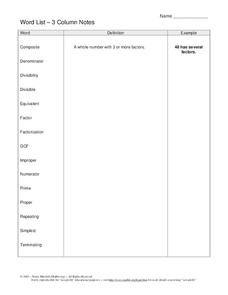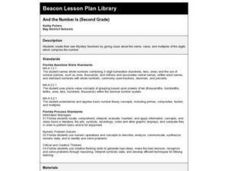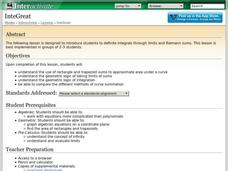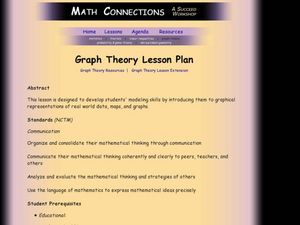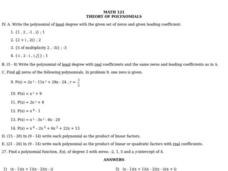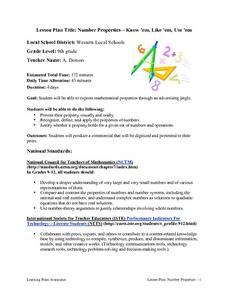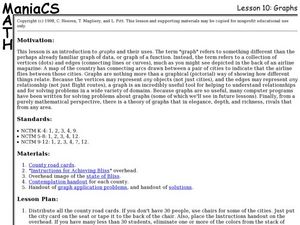Curated OER
Multiplication Is Fun
Students practice basic multiplication facts using an Internet program. Students participate in discussion and guided practices concerning the theory and practice of multiplication. Using a provided link, they complete practice...
Curated OER
Math terms
In this math notes worksheet, students fill in the definition and example for terms having to do with different types of factors. Students complete 14 terms.
Curated OER
And the Number Is (Second Grade)
Second graders create Mystery Numbers. They give the class clues about the name, value, and multiples of the digits which make up the number.
Curated OER
Pythagoras' Theorem
Students are introduced to the Pythagoras' Theorem and its history, proofs and practice in application. Students find perimeters, areas and volume of everyday objects. Students state and explain the theory.
EngageNY
Polynomial, Rational, and Radical Relationships
This assessment pair goes way beyond simple graphing, factoring and solving polynomial equations, really forcing learners to investigate the math ideas behind the calculations. Short and to-the-point questions build on one another,...
Curated OER
2-Dimensional Shapes: Coloring Shapes
For beginners to color, number, and shape theory, this is a great way to solidify skills. They use a key at the top to determine which color (yellow, green, purple, or blue) to shade each shape (square, triangle, circle, and rectangle,...
Alabama Learning Exchange
Bloodstain Pattern Doesn't Lie......
An interesting instructional activity on hypothesizing about the diameter of a drop of blood that is splattered. To test their theories, learners work in groups to make blood droplets splatter from different heights. They use graphed...
Curated OER
Reflection of Light
Students experiment with reflections of two plane mirrors placed at a 90 degree angle to see what will be reflected.
Illustrative Mathematics
Reasoning about Multiplication
In critiquing someone else's theory, learners share insight into their own understanding of mathematical concepts. Fifth graders will explore the notion that products are always larger than their factors. While this statement is...
Rice University
Calculus Volume 2
Delve into the middle of calculus. The resource is the second eBook of three that covers the complete calculus content. Seven chapters begin with integrals and different methods of integration before moving on to differential equations....
Curated OER
Scale Model of the Solar System
Young scientists gain a better understanding of space, the solar system and its vastness by creating a scale model. Students first need to calculate the distance between each of the nine planets according to the size of their scale. This...
Shodor Education Foundation
InteGreat
Hands-on investigation of Riemann sums becomes possible without intensive arithmetic gymnastics with this interactive lesson plan. Learners manipulate online graphing tools to develop and test theories about right, left, and...
Curated OER
Math Club #16: Knot Theory
In this math club #16: knot theory worksheet, 9th graders read about knot theory, analyze diagrams of knots, make knots to match the diagrams and answer 6 questions about advanced knots.
Curated OER
Graph Theory
Students explore the concept of graph theory. For this graph theory lesson, students participate in hands-on activities that enforce graph theory. Students manipulate graph applets on the internet. Students create a graphical model of...
Curated OER
Theory of Polynomials
In this theory of polynomials activity, students use the discriminant to determine whether the zeros are real and equal, real and unequal or complex. They find the values of the roots. This two-page activity contains 16 problems. ...
Curated OER
Theory of Polynomials
In this theory of polynomials worksheet, students solve nine problems total related to polynomials. In this first part, they use synthetic division to find the quotient, and the remainder if there is a dividend and a divisor. In the...
Curated OER
Theory of Polynomials
In this polynomial activity, students find all zeros of polynomials. They write polynomials as the product of linear fractions. This two-page activity contains 27 problems. The second page provides answers.
Curated OER
The Integration of Science and Math Through Ecosystems
Students use the disciplines of math and science to examine ecosystems. In groups, they calculate the amount of supplies they would need to live in the classroom for one day, a week and a year. Using this information, they apply it to...
Curated OER
An Introduction to Measuring Theory
Students investigate one, two and three dimensional objects. In this algebra lesson, students differentiate between different shapes of objects and write equations to represent each. They start with what they already know and prove...
Curated OER
Architecture And Math
Students investigate the ties that architecture and math have in common. They focus on works of architecture in the world that is considered of great significance. Students use the internet to find building images from around the world....
Curated OER
Number Properties-Know'em, Like'em, Use'em
Ninth graders explore mathematical properties through the use of an advertising jingle. They produce a commercial that is digitized and presented to the class. Students write a jingle that simplifies each property and helps classmates...
Curated OER
The Big Bang-Cosmic Expansion
In this Big Bang worksheet, learners are given the equation used to determine the rate at which the universe is expanding according to the Big Bang theory. Students solve 4 problems using this equation. They find the integral for time,...
Curated OER
Exploring the Big Bang with the LHC
In this Big Bang Theory worksheet, students read about how scientists simulate the original Big Bang conditions using atom smashers. Students solve 4 problems given about the Big Bang. They find the average collision energy of particles...
Curated OER
Lesson 10: Graphs
Students explore graph theory. In this geometry lesson, graphs are used to solve problems in a variety of domains. In this lesson the term graph refers to a collection of vertices and edges used to depict...



